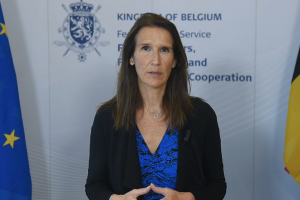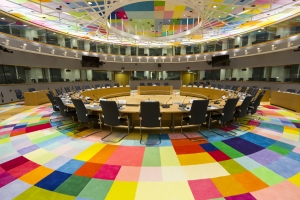Foreign Affairs Council of the European Union of 12 July: conclusions
On Monday 12 July, the Deputy Prime Minister and Minister for Foreign Affairs, Sophie Wilmès, and her European counterparts met in Brussels for the Foreign Affairs Council (FAC) meeting.
Meeting with Yair Lapid, Minister of Foreign Affairs of Israel
In the afternoon, the EU Foreign Ministers also had an exchange of views with their new Israeli counterpart, Mr Yair Lapid, who was on his first visit to Brussels. The discussion focused on EU-Israel bilateral relations, on the regional issues of common interest and on the Middle East Peace Process.
On this last point, Deputy Prime Minister Wilmès stressed to her Israeli counterpart that "Israel's peace and security ultimately depend on a comprehensive, just and equitable solution to the conflict and on respect for the rights of the Palestinians as individuals and as a people." "Belgium, like the EU, therefore calls for an end to the occupation and settlement policy, including in East Jerusalem. The demolition and confiscation of property in the Palestinian community of Humsa - Al Bqai'a last week is of great concern." She states, "We call on both sides to refrain from unilateral actions that undermine the feasibility of a political solution, and we call on them to work again towards a long-term peace."
Strategic Compass
The Council discussed the EU's Strategic Compass, intended to guide its defence and security policy. As a reminder, ten days ago, the Belgian Foreign Affairs organised a seminar with - for the first time - senior representatives of the 27 Foreign and Defence Ministries of the European member states.
Today in the Council, Deputy Prime Minister Wilmès shared with her colleagues the recommendations resulting from this seminar: "Europe must assume greater responsibility for its own security and for the stability of its neighbourhood. The compass must therefore focus above all on concrete results in terms of crisis management in the field of security and defence. It should enable us to act more quickly against hybrid, environmental or cyber security threats, but also to strengthen our economic security," explained Sophie Wilmès. "To increase our military capabilities, we need to use existing EU instruments (e.g. CSP, EDF or CARD) more effectively and coherently, and coordinate better with NATO. Thus, the Compass is also an asset in our partnerships, particularly with NATO and the United States." Finally, the Strategic Compass should not be a one-off exercise. At the beginning of each European legislature, the threat analysis and the objectives derived from it must be updated. "In conclusion, we must continue to invest in political commitment and strong governance for our security and defence," Sophie Wilmès said.
Ethiopia
At the initiative of High Representative Borrell, the Council again assessed the situation in Ethiopia following the elections on 21 June, eight months after the start of hostilities in the Tigray region. Despite the unilateral and temporary ceasefire declared by the federal government late last month, the humanitarian situation continues to deteriorate, with fires spreading to other parts of the country and tensions escalating with neighbouring countries.
Belgium is concerned about the situation in the country itself but also for the stability of the region. Our country calls on the European Union to urge all parties to respect and implement the ceasefire declared unilaterally by the Ethiopian Government and to begin negotiations. Each party must take concrete steps, particularly in the area of humanitarian aid and access. About 91% of the population of Tigray - more than 5 million people - are in urgent need of assistance. An estimated 2 million people have been displaced. Belgium believes that it is high time that all parties to the conflict - starting with the authorities who are responsible for protecting the population on their territory - took account of the tragedy currently taking place.
Furthermore, Belgium welcomes the coordinated approach adopted by the EU, the efforts undertaken to maintain dialogue with Ethiopia and the draft resolution submitted by the EEAS to the Human Rights Council in Geneva. Our country remains convinced that the fight against impunity, the establishment of responsibilities and support for victims will contribute to reconciliation and to ending the crisis.
Belgium is awaiting the conclusions of the field study conducted by the services of the UN High Commissioner for Human Rights, Ms Bachelet, which should be published in August. For Belgium, depending on the content of the report, the EU must be prepared to consider restrictive measures for our country.
Afghanistan
The Council also discussed the latest developments in the situation in Afghanistan in the context of the withdrawal of US and NATO troops. At the same time as this withdrawal, violence has gained ground, as has the Taliban on the Afghan army. Developments on the ground and in the region are therefore of great concern to Belgium. There is no choice but to continue our efforts. On the one hand, by continuing to support a process of Afghan national reconciliation - reconciliation that respects the fundamental rights and freedoms of the population, especially the most vulnerable such as women and minorities. On the other hand, no one can turn a blind eye to the risk of a humanitarian tragedy. Belgium calls on the various forces to join together to analyse the needs and determine how to help the Afghan population in order to protect them from an even more serious situation.
For Belgium, a national peace process with international support is the only viable option. The EU should continue its diplomatic efforts in this direction with other relevant actors, such as the United States, Turkey and regional actors.


